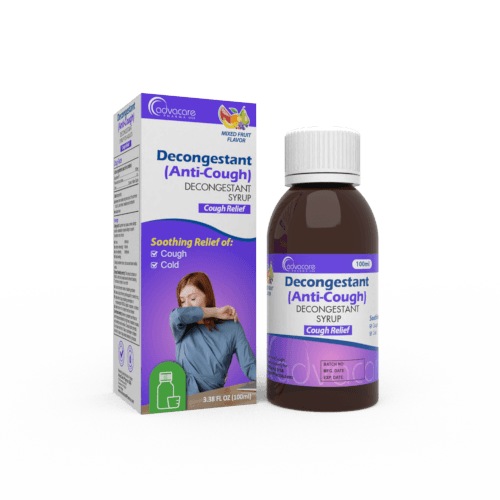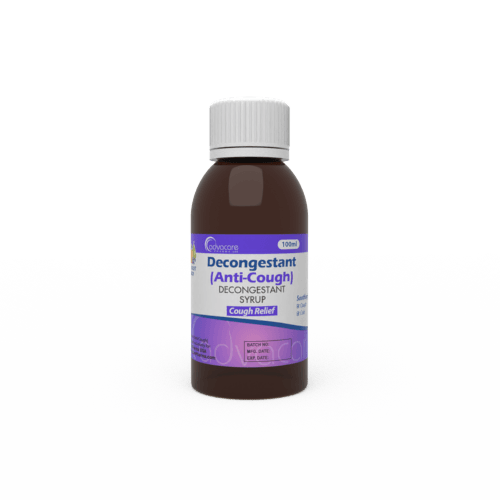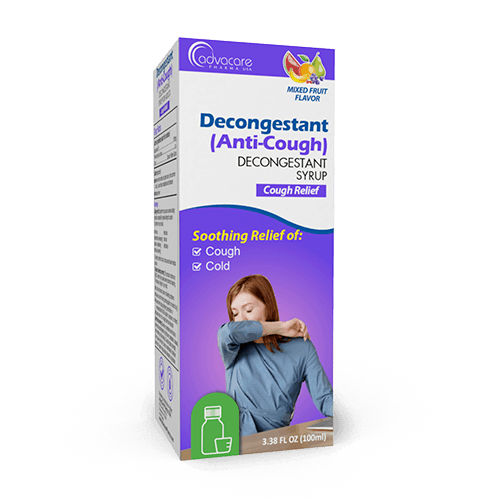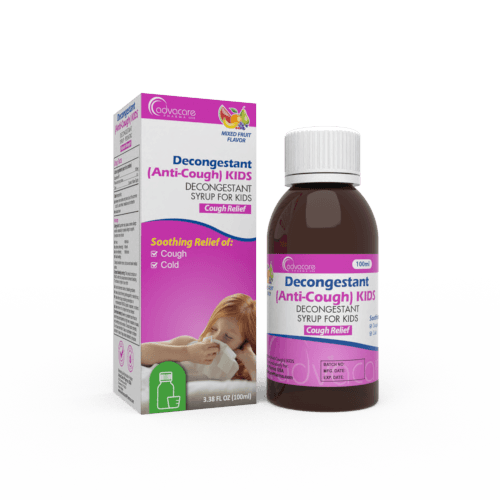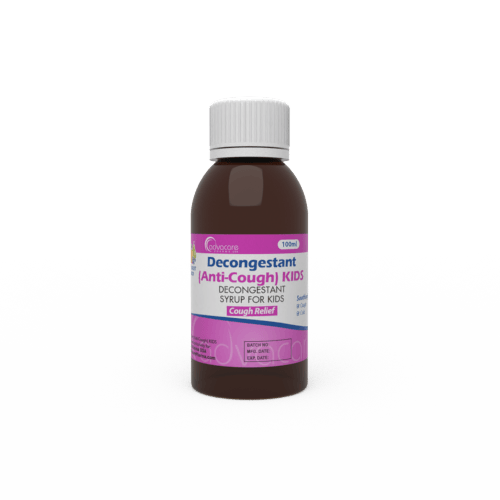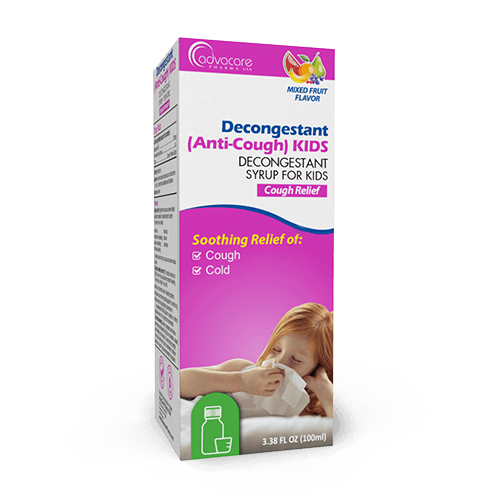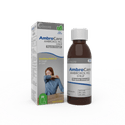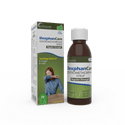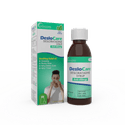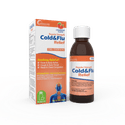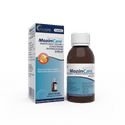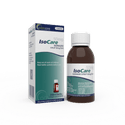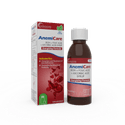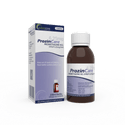- Home›
- Pharmaceuticals›
- Syrups›
- Decongestant Syrup
Decongestant Syrup
Dosage
Packaging
What is Decongestant Syrup?
Active Ingredients: Guaifenesin, Pseudoephedrine HCl, Phenylephrine HCl, Diphenhydramine HCl, Chlorpheniramine Maleate
Decongestant Syrup (Guaifenesin, Pseudoephedrine HCl, Phenylephrine HCl, Diphenhydramine HCl, Chlorpheniramine Maleate) is a fixed-dose combination drug used to temporarily relieve cough, chest congestion, sneezing, sore throat, stuffy nose, and other similar symptoms. It is typically used in the treatment of the common cold, flu, allergies, hay fever, or other illnesses connected with breathing.
This Decongestant Syrup is available in two formulations: one for adults and one for children.
Decongestant (Anti-Cough)™ contains two active ingredients: Guaifenesin and Pseudoephedrine HCl. Guaifenesin belongs to the family of medicines called expectorants. It works to thin the mucus or phlegm in the lungs. Pseudoephedrine HCl is a nasal decongestant. This ingredient works by drying out the nasal passages.
Decongestant (Anti-Cough)™ KIDS contains 3 active ingredients: Phenylephrine HCl, Diphenhydramine HCl, and Chlorpheniramine Maleate. Phenylephrine HCl is a decongestant. It is classified as a sympathomimetic amine that works as a vasoconstrictor. Diphenhydramine HCl and Chlorpheniramine Maleate are both antihistamines. These ingredients block the activity of histamine, which relieves symptoms such as a runny nose and watery eyes.
The adult formulation of Decongestant Syrup, with Guaifenesin and Pseudoephedrine HCl, offers a dual approach to treating cold and flu symptoms. Guaifenesin, as an expectorant, assists in making the cough more productive by loosening the chest congestion. Pseudoephedrine constrains the blood vessels in the nasal passages, effectively alleviates congestion.
Note that the drug's stimulant effects can sometimes lead to side effects like insomnia or increased heart rate, especially in sensitive individuals or when used in higher than recommended doses.
In the children's formulation, the antihistamines, Diphenhydramine HCl and Chlorpheniramine Maleate, both help in relieving allergy symptoms like sneezing, runny nose, and watery eyes by blocking histamine receptors. But these can cause drowsiness, which might be beneficial at bedtime but could interfere with daytime activities.
This medication is produced and exported by AdvaCare Pharma. Decongestant Syrup is manufactured in our facilities in China, India, and the USA. These production factories are GMP certified and are regularly inspected to ensure they meet health, safety, and environmental standards.
Why choose us as your Decongestant Syrup manufacturer?
AdvaCare Pharma is a reputable manufacturer of Decongestant Syrup, and other pharmaceutical syrups, with a presence in 65 countries. We have implemented a "vested supplier-distributor relationship" business model that differentiates us from other large-scale medical manufacturers, facilitating a closer partnership with our pharmaceutical distributors. With a range of more than 500 GMP-approved medicines, including 55+ treatments in oral liquid dosage form, we are a Decongestant Syrup manufacturer that doctors trust and patients rely on.
Composition
Decongestant (Anti-Cough)
Each 5ml: Guaifenesin: 100mg, Pseudoephedrine HCl: 30mg
Decongestant (Anti-Cough) KIDS
Each 5ml: Phenylephrine HCl: 5mg, Diphenhydramine HCl: 5mg, Chlorpheniramine Maleate: 0.75mg
Uses
What is Decongestant Syrup used for?
It is used to temporarily relieve cold-related symptoms like cough, chest congestion, sneezing, sore throat, and stuffy nose.
How is Decongestant Syrup used?
This medication is manufactured as a liquid to be taken orally. Decongestant Syrup should be shaken well before use.
What dose should be taken?
For adults, the usual dose of Decongestant (Anti-Cough)™ is 10-20ml, taken every 4 hours as needed.
The usual dose of Decongestant (Anti-Cough) KIDS™ is 10-20ml, taken every 4 hours as needed. The exact dosage is dependent on age and weight. Do not give this medicine to children under 6 years old.
Refer to a doctor or pharmacist for guidelines on the exact dosage.
Is Decongestant Syrup effective in treating allergic rhinitis?
Yes, it can be effective in alleviating symptoms of allergic rhinitis, such as sneezing and nasal congestion. Its antihistamine components, particularly in the children's formulation, help in reducing allergic reactions.
How does Decongestant Syrup work to alleviate nasal congestion?
Decongestant Syrup alleviates nasal congestion primarily through Pseudoephedrine and Phenylephrine. These are sympathomimetic amines, which work by constricting blood vessels in the nasal passages. The vasoconstriction reduces the swelling and inflammation in the nasal tissues, leading to decreased congestion and improved airflow. Pseudoephedrine and Phenylephrine are effective in providing rapid relief from nasal congestion associated with colds, flu, and allergies.
Can Decongestant Syrup be used for chronic respiratory conditions?
It is not typically recommended for chronic respiratory conditions such as chronic bronchitis or asthma, as these need specific long-term interventions. Decongestant Syrup is generally intended for temporary relief of symptoms associated with acute conditions like the common cold or flu.
Is Decongestant Syrup suitable for treating all types of coughs?
It is formulated to treat coughs associated with chest congestion and the common cold, where mucus production is a significant symptom. The expectorant component, Guaifenesin, helps in thinning and loosening mucus in the airways.
For dry or non-productive coughs, a cough suppressant may be more appropriate. Decongestant Syrup may not be effective for coughs caused by smoking, asthma, or chronic bronchitis, and a different type of medication would typically be recommended.
How long does it take for Decongestant Syrup to work?
It typically starts to relieve symptoms within a short time after ingestion, with peak effects occurring within an hour. The duration of relief can vary based on the individual and the severity of symptoms.
How does Decongestant Syrup interact with other cold medications?
Caution should be exercised when combining this drug with other over-the-counter cold medications, as they may contain similar or conflicting active ingredients.
Is Decongestant Syrup effective in treating post-nasal drip?
It can be effective in reducing post-nasal drip by thinning mucus and reducing nasal congestion.
How does Decongestant Syrup differ from a cough suppressant?
This drug primarily targets congestion and allergy symptoms, while cough suppressants are specifically formulated to inhibit the cough reflex. Decongestants may contain cough-suppressing ingredients but also addresses a broader range of symptoms.
Can Decongestant Syrup be used for a dry cough?
Decongestant Syrup may not be as effective for a dry cough, as it is primarily formulated to address congestion and allergy symptoms. For a dry cough, a cough suppressant may be more appropriate.
Is Decongestant Syrup effective in treating bronchitis?
It can help relieve symptoms of bronchitis, such as chest congestion and coughing but it does not treat the underlying inflammation of the bronchi. It is not a replacement for antibiotics if the bronchitis is bacterial in nature.
Can Decongestant Syrup be used alongside antibiotics for bacterial infections?
Yes, but it does not have any antibacterial properties and does not replace the need for antibiotics when a bacterial infection is present.
Can Decongestant Syrup help with sinus pressure and pain?
Yes, it can help by reducing nasal congestion and swelling in the nasal passages.
Can Decongestant Syrup cause drowsiness?
Some ingredients in this syrup, particularly antihistamines in the children’s formulation, can cause drowsiness. This should be taken into consideration, especially when performing tasks that require alertness.
Can Decongestant Syrup be taken before bedtime?
While it can be taken before bedtime to relieve symptoms and potentially improve sleep, caution should be taken due to the possibility of drowsiness or insomnia, depending on the individual's reaction.
Can Decongestant Syrup be used in combination with inhalers for asthma?
While Decongestant Syrup may alleviate some symptoms associated with asthma, such as chest congestion, it is not a substitute for asthma-specific treatments like inhalers. Patients with asthma should consult a doctor first.
Does Decongestant Syrup have any impact on blood pressure?
Its decongestant components, especially Pseudoephedrine and Phenylephrine, may increase blood pressure. Patients with hypertension or heart disease should use this medication cautiously.
Is Decongestant Syrup safe for individuals with liver problems?
Patients with liver impairment should use this syrup cautiously. The metabolism and clearance of some of its components may be altered in liver disease, potentially leading to increased side effects.
Can Decongestant Syrup be used for a prolonged period?
Prolonged use of this syrup is generally not recommended. Extended use, particularly of the decongestant components, can lead to rebound congestion. If symptoms persist or worsen, seek medical advice.
How does Decongestant Syrup interact with sedative medications?
The antihistamines in this product can enhance the sedative effects of other medications. This includes certain sleep aids, anti-anxiety drugs, and muscle relaxants. Combining these can lead to increased drowsiness and decreased alertness.
How should Decongestant Syrup be stored?
It should be kept at room temperature, away from direct light and moisture. The bottle should be tightly closed when not in use to maintain the quality of the medication.
Side Effects
As with all pharmaceuticals, some unwanted effects can occur from the use of Decongestant Syrup.
Common side effects include, but may not be limited to:
- dizziness
- headache
- nausea
- nervousness
- trouble sleeping
For a comprehensive understanding of all potential side effects, consult a medical professional.
Users should be aware of the risk of overuse or misuse, particularly of the decongestant components like Pseudoephedrine and Phenylephrine. These substances can lead to rebound congestion, where nasal passages become more congested once the medication wears off, leading to a cycle of dependency and chronic congestion.
The antihistamines in the syrup, such as Diphenhydramine and Chlorpheniramine, may contribute to anticholinergic side effects like dry mouth, urinary retention, and blurred vision, especially in elderly patients or those with pre-existing conditions that could be exacerbated by these effects. Regular consultation with a healthcare provider is advisable.
If any symptoms persist or worsen, or you notice any other symptoms, please call your doctor.
Precautions
Do NOT use Decongestant Syrup if:
- You are allergic to any of the other ingredients.
- You have an ongoing cough from smoking, asthma, or other long-term breathing problems.
Possible interactions may occur with other pharmaceutical products. Consult with a doctor or pharmacist about any medications you are taking before starting treatment.
Cold medications are not safe for the use of children younger than 6 years, if not prescribed by a doctor.
References
Effect of d-Pseudoephedrine on Cough Reflex and Its Mode of Action in Guinea Pigs
d-Pseudoephedrine (PSE) is applied for patients with a common cold and upper respiratory inflammation as a decongestant.
This animal study investigated the antitussive effects of intraperitoneal injection of PSE on the cough reflex induced by microinjection of citric acid into the larynx of guinea pigs.
PSE lead to a dose-dependent decrease in the number of cough reflexes (−18.3 ± 5.0% at 20mg/kg, P < 0.05; −41.1 ± 7.2% at 60mg/kg, P < 0.01). PSE also suppressed the increases in amplitude and frequency of afferent discharge from the superior laryngeal nerve.
The conclusion is that PSE has an antitussive effect through both central and peripheral mechanisms.
You might be interested in...
Why AdvaCare Pharma?
As an industry leader, we are aware of our responsibility to provide affordable and sustainable solutions to improve healthcare worldwide.
